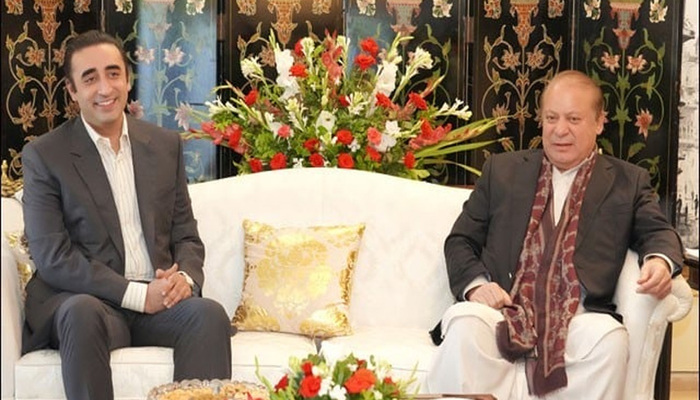
ISLAMABAD: Pakistan Muslim League-Nawaz (PML-N) President Nawaz Sharif and Pakistan Peoples Party (PPP) Chairman Bilawal Bhutto Zardari have reached an agreement on constitutional amendments. Bilawal visited Nawaz Sharif at the Punjab House, where the former Prime Minister warmly welcomed him.
During their meeting, the two leaders discussed Pakistan’s political situation. Their conversation centered on judicial reforms and constitutional amendments. They agreed to present these amendments in Parliament after consulting other political parties. The timeline for this process will also be finalized in coordination with the parties involved.
One of the main amendments proposes the creation of a Federal Constitutional Court alongside the Supreme Court. The Chief Justice of this new court would serve for three years, retiring at the age of 68. Another amendment suggests disregarding votes from parliamentarians who vote against their party’s instructions.
Read: PM Shehbaz Sharif Announces Major Public Relief through IPP Agreements
Changes in Judicial Appointments
The amendments propose that the Prime Minister, based on recommendations from an eight-member committee, will appoint the Chief Justices of the Supreme Court and the Federal Constitutional Court. This committee will consist of National Assembly members and senior judges. Additionally, changes to Article 175 suggest that a commission, led by the Chief Justice of the Constitutional Court, will appoint judges to High Courts and Sharia Courts.
Amendments to Article 48 aim to prevent courts or tribunals from reviewing advice given by the Prime Minister or Cabinet to the President. This proposal is designed to protect executive decisions from judicial interference.
After the meeting, Nawaz Sharif was scheduled to attend a dinner honoring a visiting Saudi delegation later in the evening.
Broader Debate on Reforms
These amendments are part of a broader government effort to reform the judiciary. The proposals have sparked significant debate, especially among coalition partners who are concerned about the lack of transparency in the drafting process. Despite the concerns, the government maintains that the changes will enhance judicial independence and strengthen Pakistan’s legal system.
If passed, these constitutional amendments will significantly reshape Pakistan’s judiciary and legal landscape. They will change how judges are appointed, how parliamentary votes are counted, and how executive powers are exercised.
Follow us on Google News, Instagram, YouTube, Facebook,Whats App, and TikTok for latest updates
